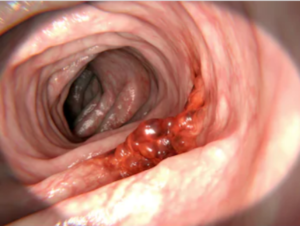
If you have IBS, you may be fearing eventual cancer, wondering if irritable bowel syndrome can lead to or increase cancer risk.
The symptoms of IBS are nearly identical to the symptoms of colon cancer.
Symptoms of IBS can be scary, and include alternating bouts of diarrhea and constipation — which can occur with colon cancer as well.
Abdominal pain is another classic feature of both irritable bowel syndrome and colon cancer.
Ten to 20 percent of the U.S. has IBS; this disorder is diagnosed after other possible causes of the symptoms have been ruled out.
Is there a connection between IBS and colon cancer?
“IBS never leads to bowel polyps or cancer,” says Santosh Sanagapalli, MD, a consultant gastroenterologist, endoscopist, colonoscopist and specialist in esophageal and bowel disorders.
“IBS is a type of functional GI disorder,” continues Dr. Sanagapalli.
“We term it ‘functional’ because in such conditions, the structure of the bowel is completely normal, but there can be abnormalities in the way it functions.
“Hypothetically, if we removed a piece of bowel and looked at it under the microscope, it would appear completely normal.
“However, the bowel may have issues with the way it contracts and relaxes, and may be abnormally sensitive to normal functions of the bowel, e.g., digestion and bacterial fermentation of food contents in the bowel.
“While these abnormalities in function of the bowel can lead to troublesome symptoms, no damage is being done to the bowel or body.
“There is therefore never any risk of needing surgery, and never any risk of cancer developing.”
Why can both IBS and colon cancer cause thin bowel movements?
The abnormal contractions with IBS can result in voiding pencil-thin stools.
In colon cancer, the tumor partially obstructs the anus, so that the stools being squeezed out have a limited space to exit, making them narrow.
Stop Fearing Colon Cancer just Because You Have IBS
A report in the American Journal of Gastroenterology (2010) has reassuring news.
IBS is not a marker or a predictive value for future colon cancer or even precancerous polyps.
The study investigated colonoscopy results of people with IBS.
If you have irritable bowel syndrome and NO alarming symptoms such as unexplained weight loss or blood in your poops, you do not need a colonoscopy.
However, having IBS doesn’t mean you should let your guard down when it comes to colon cancer.
A person with IBS may eventually develop colon cancer, but this development would have NOTHING to do with the IBS! It would just be a coincidence.
If you have an odd change in bowel habits lasting longer than two weeks with other new GI symptoms, consult with a gastroenterologist to rule out colon cancer.

 Dr. Sanagapalli
Dr. Sanagapalli







































